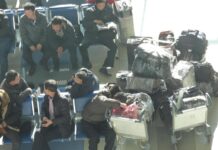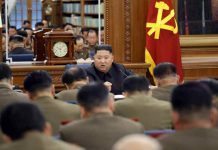
Before North Korea’s government passed the “Reactionary Ideology and Culture Rejection Act” in December 2020, North Korean leader Kim Jong Un issued an order to “sound the guns” as part of efforts to instill fear in the younger generation and prevent an atmosphere of distrust in the socialist system.
The Kim Jong Un regime had long been concerned about young people’s lack of faith in the socialist system as well as defections by young people who came in contact with foreign information and materials. As a result, the authorities moved to create terror among their citizens by imposing draconian punishments to strictly control what people thought and did.
On October 1, 2020, Kim received a comprehensive report from the Ministry of State Security, the Ministry of Social Security, and the Military Security Command on the emergence of “black markets” and organizations that sell foreign digital content. After reading the report, he issued the order to “sound the guns.”
A violation of international agreements
Article 6 of the International Covenant on Civil and Political Rights (ICCPR) establishes the signatories’ obligation to protect the right to life of every human being. According to Clause 1 of Article 6, every human being has the inherent right to life, which shall be protected by law, and no one shall arbitrarily deprive another of his life. According to Clause 2, in countries that have not abolished the death penalty, the death penalty may be imposed only for the most serious crimes, adhering to the law in force at the time of the commission of the crime, and may be carried out only after a final judgment has been rendered by a competent court.
North Korea signed the ICCPR on September 14, 1981. The right to life enshrined in Article 6 of the ICCPR is the most fundamental and sacred right that remains unchanged even in emergencies that threaten the very existence of the state.
When Kim ordered his officials to “sound the guns,” he did not simply mean that the authorities should fire their guns into the air. Instead, he was ordering them to crack down on and punish people who imported and distributed foreign video content and to shoot people in cases of serious violations.
During the Kim Il Sung regime, people who came into contact with “impure,” anti-regime materials were classified as anti-party, anti-revolutionary factionalists, and then shot or sent en masse to political prison camps.
His successor, Kim Jong Il, issued an order to “let the guns sound” to prevent the alienation of public opinion when distrust of the state and the system grew due to the great famine of the 1990s, commonly known as the Arduous March. Numerous tanks rolled through the streets of Pyongyang, and the citizens of the capital, startled by the sound of the tanks, felt a kind of terror comparable to that caused by war.
Order leads to torture, death sentences
Kim Jong Un’s order to “sound the guns,” which was similar to his father’s order, was issued to law enforcement and security agencies in October 2020.
As a result of the order, numerous people who came into contact with foreign cultural content were branded as reactionaries and executed.
In February of 2021, Pyongyang police arrested a 22-year-old male student of the Pyongyang University of Science and Technology for distributing various videos such as South Korean dramas, movies, and music videos to more than 20 people. The authorities locked him up in a detention center and subjected him to cruel torture to extract a confession.
The student initially resisted, claiming that he had accidentally picked up the memory card containing the videos while riding the subway. However, after being subjected to extreme torture, he finally confessed that he had traded it in Yanggang Province. Fortunately, he avoided the death penalty and was sentenced to 15 years of reform through labor for revealing the name of the original supplier.
A vicious crackdown was also launched in major cities such as Sinuiju, Chongjin, Kanggye, Pyongsong, Sariwon, Haeju, and Wonsan. Security and police officials took advantage of the opportunity to line their pockets with bribes and illegal transactions.
In March 2021, Hamhung security officials arrested a 19-year-old man surnamed Cho for distributing South Korean videos and deprived him of even a sip of water for five days.
The guards at the detention center committed various human rights violations to extract a confession from him, including humiliating him by placing him naked in front of bars in the detention center and not allowing him to go to the bathroom.
The young man was finally sentenced to one year of hard labor after his parents paid a bribe of USD 3,000. While being treated at home because the severity of his malnutrition prevented him from being sent to forced labor camps, he eventually took his own life. His suicide note read, “I will forever be labeled as a problematic youth corrupted by reactionary ideology, so I don’t want to live anymore. I’m sorry to my parents.”
The party committee of South Hamgyong Province used this tragic case to launch a crackdown. The authorities stepped up the intensity of cultural education for the youth, claiming that “[the young man’s case] was the inevitable fate of someone who betrayed the party and nation that raised him and allowed his ideology to be corrupted by becoming addicted to South Korean movies, the country with the highest suicide rate in the world.”
The ICCPR guarantees people in signatory countries the right to a fair trial and the right not to be tortured, but North Koreans have not been guaranteed these rights. North Koreans have been enraged by their government’s brutal punishments aimed at upholding the Reactionary Ideology and Culture Rejection Act. Some are wondering whether the authorities are overreaching in their crackdowns and “killing all the young and middle-aged people in the country with a view to complete the Revolution with just the judges that remain.”
Translated by Annie Eunjung Kim. Edited by Robert Lauler.
Please send any comments or questions about this article to dailynkenglish@uni-media.net.


















